From the Archive: With still no end in sight for the Afghan War, President Obama can’t say he wasn’t warned. Barely two months into his presidency in 2009, ex-CIA analyst Ray McGovern welcomed Obama to his own Vietnam quagmire.
By Ray McGovern (Originally published March 28, 2009)
I was wrong. I had been saying that it would be naïve to take too seriously presidential candidate Barack Obama’s rhetoric regarding the need to escalate the war in Afghanistan.
I kept thinking to myself that when he got briefed on the history of Afghanistan and the oft-proven ability of Afghan “militants” to drive out foreign invaders — from Alexander the Great, to the Persians, the Mongolians, Indians, British, Russians — he would be sure to understand why they call mountainous Afghanistan the “graveyard of empires.”
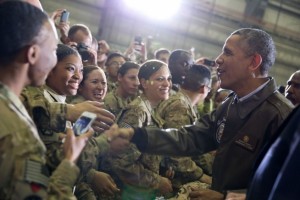
President Barack Obama shakes hands with U.S. troops at Bagram Airfield in Bagram, Afghanistan, Sunday, May 25, 2014. (Official White House Photo by Pete Souza)
And surely he would be fully briefed on the stupidity and deceit that left 58,000 U.S. troops — not to mention 2 million to 3 million Vietnamese — dead in Vietnam.
John Kennedy became President the year Obama was born. One cannot expect toddler-to-teenager Barack to remember much about the war in Vietnam, and it was probably too early for that searing, controversial experience to have found its way into the history texts as he was growing up.
But he was certainly old enough to absorb the fecklessness and brutality of the U.S. invasion and occupation of Iraq. And his instincts at that time were good enough to see through the Bush administration’s duplicity.
And, with him now in the White House, surely some of his advisers would be able to brief him on both Vietnam and Iraq, and prevent him from making similar mistakes — this time in Afghanistan. Or so I thought.
Deflecting an off-the-topic question at his March 24, 2009 press conference, Obama said, “I think that the last 64 days has been dominated by me trying to figure out how we’re going to fix the economy. … Right now the American people are judging me exactly the way I should be judged, and that is, are we taking the steps to improve liquidity in the financial markets, create jobs, get businesses to reopen, keep America safe?”
Okay, it is understandable that President Obama has been totally absorbed with the financial crisis. But surely, unlike predecessors supposedly unable to do two things at the same time, our resourceful new President certainly could find enough time to solicit advice from a wide circle, get a better grip on the huge stakes in Afghanistan, and arrive at sensible decisions. Or so I thought.
Getting Railroaded?
It proved to be a bit awkward Friday morning waiting for the President to appear – a half-hour late for his own presentation. Was he for some reason reluctant?
Perhaps he had a sense of being railroaded by his advisers. Perhaps he paused on learning that just a few hours earlier a soldier of the Afghan army shot dead two U.S. troops and wounded a third before killing himself, and that Taliban fighters had stormed an Afghan police post and killed 10 police earlier that morning.
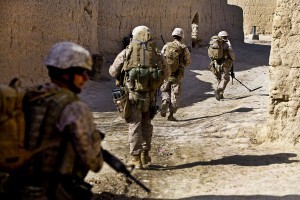
U.S. Marines patrol street in Shah Karez in Helmand Province, Afghanistan. (Marine Corps photo by Staff Sgt. Robert Storm)
Should he weave that somehow into his speech?
Or maybe it was learning of the Taliban ambush of a police convoy which wounded seven other policemen; or the suicide bomber in the Afghan border area of Pakistan who demolished a mosque packed with hundreds of worshippers attending Friday prayers, killing some 50 and injuring scores more, according to preliminary reports.
Or, more simply, perhaps Obama’s instincts told him he was about to do something he will regret. Maybe that’s why he was embarrassingly late in coming to the podium. One look at the national security advisers arrayed behind the President was enough to see wooden-headedness.
In her classic book, The March of Folly: From Troy to Vietnam, historian Barbara Tuchman described this mindset: “Wooden-headedness assesses a situation in terms of preconceived fixed notions, while ignoring or rejecting any contrary signs … acting according to the wish while not allowing oneself to be deflected by the facts.”
Tuchman pointed to 16th Century Philip II of Spain as a kind of Nobel laureate of wooden-headedness. Comparisons can be invidious, but the thing about Philip was that he drained state revenues by failed adventures overseas, leading to Spain’s decline.
It is wooden-headedness, in my view, that permeates the “comprehensive, new strategy for Afghanistan and Pakistan” that the President announced when he finally did arrive. Author Tuchman points succinctly to what flows from wooden-headedness:
“Once a policy has been adopted and implemented, all subsequent activity becomes an effort to justify it. … Adjustment is painful. For the ruler it is easier, once he has entered the policy box, to stay inside. For the lesser official it is better not to make waves, not to press evidence that the chief will find painful to accept. Psychologists call the process of screening out discordant information ‘cognitive dissonance,’ an academic disguise for ‘Don’t confuse me with the facts.’”
It seems only right and fitting that Barbara Tuchman’s daughter, Jessica Tuchman Mathews, president of the Carnegie Foundation, has shown herself to be inoculated against “cognitive dissonance.”
A January 2009 Carnegie report on Afghanistan concluded, “The only meaningful way to halt the insurgency’s momentum is to start withdrawing troops. The presence of foreign troops is the most important element driving the resurgence of the Taliban.”
In any case, Obama explained his decision on more robust military intervention in Afghanistan as a result of a “careful policy review” by military commanders and diplomats, the Afghani and Pakistani governments, NATO allies, and international organizations.
No Estimate? No Problem
Know why he did not mention a National Intelligence Estimate (NIE) assessing the likely effects of this slow surge in troops and trainers? Because there is none. Guess why. The reason is the same one accounting for the lack of a completed NIE before the “surge” in troop strength in Iraq in early 2007.
Apparently, Obama’s advisers did not wish to take the risk that honest analysts — ones who had been around a while, and maybe even knew something of Vietnam and Iraq, as well as Afghanistan — might also be immune to “cognitive dissonance,” and ask hard questions regarding the basis of the new strategy.
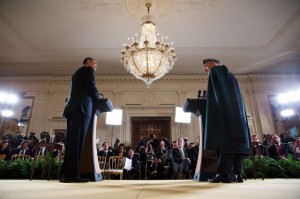
President Barack Obama and President Hamid Karzai of Afghanistan participate in a joint press conference in the East Room of the White House, Jan. 11, 2013. (Official White House Photo by Lawrence Jackson)
Indeed, they might reach the same judgment they did in the April 2006 NIE on global terrorism. The authors of that estimate had few cognitive problems and simply declared their judgment that invasions and occupations (in 2006 the target then was Iraq) do not make us safer but lead instead to an upsurge in terrorism.
The prevailing attitude this time fits the modus operandi of Gen. David Petraeus, who late last year took the lead by default with the following approach: We know best, and can run our own policy review, thank you very much.
Which he did, without requesting the formal NIE that typically precedes and informs key policy decisions. It is highly regrettable that President Obama was deprived of the chance to benefit from a formal estimate. Recent NIEs have been relatively bereft of wooden-headedess. Obama might have made a more sensible decision on how to proceed in Afghanistan.
As one might imagine, NIEs can, and should, play a key role in such circumstances, with a premium on objectivity and courage in speaking truth to power. That is precisely why Director of National Intelligence Dennis Blair appointed Chas Freeman to head the National Intelligence Council, the body that prepares NIEs — and why the Likud Lobby got him ousted.
Estimates on Vietnam
As one of the intelligence analysts watching Vietnam in the 1960s and 1970s, I worked on several of the NIEs produced before and during the war. Sensitive ones bore this unclassified title: “Probable Reactions to Various Courses of Action With Respect to North Vietnam.”
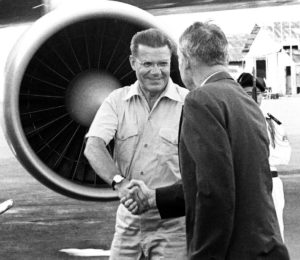
U.S. Secretary of Defense Robert McNamara leaving Saigon, September 1967 following one of his many trips to gauge the war in Vietnam. He shakes hands with U.S. Ambassador Maxwell Taylor. (Photo credit: Don North)
Typical of the kinds of question the President and his advisers wanted addressed were: Can we seal off the Ho Chi Minh Trail by bombing? If the U.S. were to introduce X thousand additional troops into South Vietnam, will Hanoi quit? Okay, how about XX thousand? Our answers regularly earned us brickbats from the White House for not being “good team players.” But in those days we labored under a strong ethos dictating that we give it to policymakers straight, without fear or favor. We had career protection for doing that. Our judgments (the unwelcome ones, anyway) were often pooh-poohed as negativism. Policymakers, of course, were in no way obliged to take them into account, and often didn’t.
The point is that they continued to be sought. Not even Lyndon Johnson or Richard Nixon would decide on a significant escalation without seeking our best estimate as to how U.S. adversaries would likely react to this or that escalatory step.
So, hats off, I suppose, to you, Gen. Petraeus and those who helped you elbow the substantive intelligence analysts off to the sidelines.
What might intelligence analysts have said on the key point of training the Afghan army and police? We will never know, but it is a safe bet those analysts who know something about Afghanistan (or about Vietnam) would roll their eyes and wish Petraeus luck.
As for Iraq, what remains to be seen is against whom the various sectarian factions target their weapons and put their training into practice.
The Training Mirage
In his Afghanistan policy speech, Obama mentioned training 11 times. To those of us with some gray in our hair, this was all too reminiscent of the prevailing rhetoric at the start of U.S. involvement in the Vietnam War.

President Lyndon Johnson announces “retaliatory” strike against North Vietnam in response to the supposed attacks on U.S. warships in the Gulf of Tonkin on Aug. 4, 1964. (Photo credit: LBJ Library)
In February 1964, with John Kennedy dead and President Lyndon Johnson improvising on Vietnam, then-Defense Secretary Robert McNamara prepared a major policy speech on defense, leaving out Vietnam, and sent it to the President to review. The Johnson tapes show the President finding fault:
LBJ: “I wonder if you shouldn’t find two minutes to devote to Vietnam.”
McN: “The problem is what to say about it.”
LBJ: “I would say that we have a commitment to Vietnamese freedom. … Our purpose is to train the [South Vietnamese] people, and our training’s going good.”
But our training was not going good then. And specialists who know Afghanistan, its various tribes and demographics tell me that training is not likely to go good there either. Ditto for training in Pakistan.
Obama’s alliterative rhetoric aside, it is going to be no easier to “disrupt, dismantle, and defeat” Al Qaeda in Pakistan and Afghanistan with more combat forces and training than it was to defeat the Viet Cong with these same tools in Vietnam.
Obama seemed to be protesting a bit too much: “Going forward, we will not blindly stay the course.” No sir.
There will be “metrics to measure progress and hold ourselves accountable!” Yes, sir!
And he will enlist wide international support from countries like Russia, India and China that, according to President Obama, “should have a stake in the security of the region.” Right.
“The road ahead will be long,” said Obama in conclusion. He has that right. The strategy adopted virtually guarantees that.
That is why Gen. David McKiernan, the top U.S. commander in Afghanistan publicly contradicted his boss, Defense Secretary Robert Gates, in late 2008 when Gates, protesting the widespread pessimism on Afghanistan, started talking up the prospect of a “surge” of troops in Afghanistan.
McKiernan insisted publicly that no Iraqi-style “surge” of forces would end the conflict in Afghanistan. “The word I don’t use for Afghanistan is ‘surge,’” McKiernan stated, adding that what is required is a “sustained commitment” that could last many years and would ultimately require a political, not military, solution.
McKiernan has that right. But his boss Mr. Gates did not seem to get it.
Bob Gates at the Gate
In late 2008, as he maneuvered to stay on as Defense Secretary in the new administration, Gates hotly disputed the notion that things were getting out of control in Afghanistan. The argument that Gates used to support his professed optimism, however, made us veteran intelligence officers gag — at least those who remember the U.S. in Vietnam in the 1960s, the Soviets in Afghanistan in the 1980s and other failed counterinsurgencies.
“The Taliban holds no land in Afghanistan, and loses every time it comes into contact with coalition forces,” Gates explained.
Our Secretary of Defense seemed to be insisting that U.S. troops have not lost one pitched battle with the Taliban or Al Qaeda. (Engagements like the one on July 13, 2008, in which “insurgents” attacked an outpost in Konar province, killing nine U.S. soldiers and wounding 15 others, apparently do not qualify as “contact.”)
Gates ought to read up on Vietnam, for his words evoke a similarly benighted comment by U.S. Army Col. Harry Summers after that war had been lost. In 1974, Summers was sent to Hanoi to try to resolve the status of Americans still listed as missing. To his North Vietnamese counterpart, Col. Tu, Summers made the mistake of bragging, “You know, you never beat us on the battlefield.”
Colonel Tu responded, “That may be so, but it is also irrelevant.”
I don’t fault the senior military. Cancel that, I DO fault them. They resemble all too closely the gutless general officers who never looked down at what was really happening in Vietnam. The Joint Chiefs of Staff of the time have been called, not without reason, “a sewer of deceit.”
The current crew is in better odor. And one may be tempted to make excuses for them, noting for example that if admirals/generals are the hammer, small wonder that to them everything looks like a nail. No, that does not excuse them.
The ones standing in back of Obama on Friday have smarts enough to have said, NO; IT’S A BAD IDEA, Mr. President. That should not be too much to expect. Gallons of blood are likely to be poured unnecessarily in the mountains and valleys of Afghanistan — probably over the next decade or longer. But not their blood.
Sound Military Advice
General officers seldom rise to the occasion. Exceptions are so few that they immediately spring to mind: French war hero Gen. Philippe LeClerc, for example, was sent to Indochina right after World War II with orders to report back on how many troops it would take to recapture Indochina. His report: “It would require 500,000 men; and even with 500,000 France could not win.”
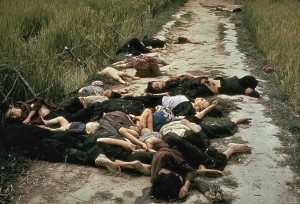
The bodies of Vietnamese men, women and children piled along a road in My Lai after a U.S. Army massacre on March 16, 1968. (Photo taken by U. S. Army photographer Ronald L. Haeberle)
Equally relevant to Obama’s fateful decision, Gen. Douglas MacArthur told another young President in April 1961: “Anyone wanting to commit American ground forces to the mainland of Asia should have his head examined.”
When JFK’s top military advisers, critical of the President’s reluctance to go against that advice, virtually called him a traitor — for pursuing a negotiated solution to the fighting in Laos, for example — Kennedy would tell them to convince Gen. MacArthur first, and then come back to him. (Alas, there seems to be no comparable Gen. MacArthur today.)
Kennedy recognized Vietnam as a potential quagmire, and was determined not to get sucked in — despite the misguided, ideologically-salted advice given him by Ivy League patricians like McGeorge Bundy. Kennedy’s military adviser, Gen. Maxwell Taylor said later that MacArthur’s statement made a “hell of an impression on the President.”
MacArthur made another comment about the situation that President Kennedy had inherited in Indochina. This one struck the young President so much that he dictated it into a memorandum of conversation: Kennedy quoted MacArthur as saying to him, “The chickens are coming home to roost from the Eisenhower years, and you live in the chicken coop.”
Well, the chickens are coming home to roost after eight years of Cheney and Bush, but there is no sign that President Obama is listening to anyone capable of fresh thinking on Afghanistan. Obama has apparently decided to stay in the chicken coop. And that can be called, well, chicken.
Can’t say I actually KNEW Jack Kennedy, but it was he who got so many of us down here to Washington to explore what we might do for our country. Kennedy resisted the kind of pressures to which President Obama has now succumbed. (There are even some, like Jim Douglass in his book JFK and the Unspeakable, who conclude that this is what got President Kennedy killed.)
Mr. Obama, you need to find some advisers who are not still wet behind the ears and who are not brown noses — preferably some who have lived Vietnam and Iraq and have an established record of responsible, fact-based analysis.
You would also do well to read Douglass’s book, and to page through the “Pentagon Papers,” instead of trying to emulate the Lincoln portrayed in Team of Rivals. I, too, am a big fan of Doris Kearns Goodwin, but Daniel Ellsberg is an author far more relevant and nourishing for this point in time. Read his Secrets, and recognize the signs of the times.
There is still time to put the brakes on this disastrous policy. One key lesson of Vietnam is that an army trained and supplied by foreign occupiers can almost always be readily outmatched and out-waited in a guerrilla war, no matter how many billions of dollars are pumped in.
Professor Martin van Creveld of the Hebrew University in Jerusalem, the only non-American military historian on the U.S. Army’s list of required reading for officers, has accused former President George W. Bush of “launching the most foolish war since Emperor Augustus in 9 BC sent his legions into Germany and lost them.”
Please do not feel you have to compete with your predecessor for such laurels.
Ray McGovern works with Tell the Word, the publishing arm of the ecumenical Church of the Saviour in inner-city Washington. In the 1960s, he served as an infantry/intelligence officer and then became a CIA analyst for the next 27 years. He is on the Steering Group of Veteran Intelligence Professionals for Sanity (VIPS).

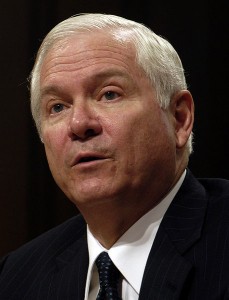
…despite the misguided, ideologically-salted advice given him by Ivy League patricians like McGeorge Bundy.
As an astute commentator on another thread said: Poison Ivy League
Bill, President Obama is a supposedly intelligent, adult human being. I heard somewhere that the buck stops with the President. If he doesn’t have the human compassion and political skills to know right from wrong, what the hell his he doing living rent free in America’s House? I ask you this. Would you allow torture? Would you allow people to languish in horrible conditions at places like Gitmo for years without any kind of trial knowing full well that many of them are innocent and have basically been sold into slavery? Would you have given the okay to destroy Libya? Would you hold a Tuesday afternoon kill club. Would you have continued this murderous insanity for going on 8 years of your administration? Would you have let George W Bush, et al off the hook? I know unequivocally that I have no doubts as a human being that I would have done none of those things. I know that if I was willing to send our soldiers off risking death for this mistake, I would be willing to risk the same sitting in the People’s House trying my best to end this disasterous catastrophic war crime of a “mistake.”
The ones standing in back of Obama on Friday have smarts enough to have said, NO; IT’S A BAD IDEA, Mr. President.
But not the moral principles and courage to say so.
My father was a hard worker, and a noble boss. My father who knew how to lead told me, ‘I never ask my employees to do something which I have never done myself’. What gave my Dad that mindset was knowing by experience what the job required, and with that mindset he was able to determine whether the employee had enough experience to perform well toward the task at hand. More importantly, a good leader wouldn’t expect much of the impossible knowing how high the bar really is. In other words these leaders, including many generals in Washington are asking far to much from their troops. Their ignorance allows them to make demands of things which can’t be attained, and this is regrettable since there are people out there dieing in order to satisfy the impossible demands put upon them by their Washington bosses. The best soldiers aren’t being decorated in the same way as their demanding overseers are, and that is the awful truth of it.
Let’s face it General David Petraeus introduced a new mantra to Washington which to this day has still some relevance, and that word is ‘Surge’. So many times since 2007 do I wish I never had heard that word. For those like many here on this site know that the Petraeus surge really wasn’t what drew down the American presence in Iraq, but still Petraeus is held up as his being some kind of hero. To take the Petraeus surge a little further, there are those who can convincingly draw a direct line between the surge and the start of ISIS.
These screwball politicians have everything messed up. People in the know of business know how flat, and even below flat business is. I personally believe that much of this drag is due to the belief that all of these sanctions had to be imposed on the nations we disagree with. An Italian farmer who has loss their Russian customer doesn’t need parts for his farm tractor, if he isn’t farming for what the Russians use to buy. This maybe a simple example of what I believe could be adding to the financial misery, but times that by a few million, and you have a business catastrophe on a large scale.
America is in love with it’s military might, and that just may be America’s greatest blunder.
What gave my Dad that mindset was knowing by experience what the job required,
Graduates of the Greek maritime academy were at one time required to serve in an unlicensed crew member capacity working and living in the lower ranks on board ships to complete their education. I don’t know if they still do it or if there are many Greek merchant marine ships on which to practice any more. However, it might be a good policy to require graduates of West Point, Annapolis and the air force academy to serve as enlisted personnel for a year before becoming officers so they would understand the consequences of some of their decisions and orders.
America is in love with it’s military might, and that just may be America’s greatest blunder.
History has many examples supporting that idea.
Bill what makes matters worst, is I don’t think the American people give much thought to our being at war. With no draft, and with poorly reported developments of war, the average American doesn’t realize the true impact of what these wars are all about. What the public does sense is their fear of terrorism. When Americans are awoken is when there is an Orlando, or a San Bernardino mass shooting, and then it’s time to bring out the drones. This is a terrible cycle, and one which we Americans should do everything within our power as citizens to bring this terrible cycle to an end. What the world needs isn’t more bombs, it needs food, and peaceful shelter, but that apparently doesn’t make the MIC get any richer, and with that the cycle of war spins on, and on, and on.
what makes matters worst, is I don’t think the American people give much thought to our being at war.
or anything above the intellectual level of a high school dropout.
Our top government officials including military commanders are directly responsible for war crimes. The article brings up two very good points: a person would have to be 60 years old today, born in 1955, to remember Vietnam much less the Cold War or the horrors committed by the US in Central and South America. You are absolutely correct that without a draft, most Americans are unaffected by the MIC war machine which gobbles up lives, nations and our tax dollars. Second, the MSM should be run out of business for its corrupt way of intentionally misleading Americans on what our country is doing to other innocents around the world. Christ, we have any number of William Calleys sitting in airconditioned comfort, 1000’s of miles from harms way blowing innocent civilians to bits. Now instead of body counts to prove how great our killing machine is, we have uncountable lies to deny the truth of our toll on innocent human life. Without justice for the political “leaders” and military commanders who issue the orders, their will be no peace for the rest of the world.